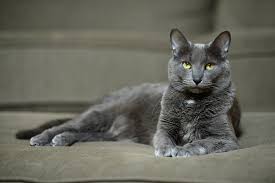
Korat
Conditions of detention
Korat cats are adaptable and can thrive in various living environments, from apartments to larger homes. They enjoy being part of family activities and require an environment where they can receive plenty of attention and interaction.
Useful Fact:
Korats are known for their sensitivity and intuition. They often form strong bonds with their human companions and can be very attentive to their owners’ emotions and moods.
Nutrition and diet
Korats require a balanced diet of high-quality cat food that includes proteins, fats, vitamins, and minerals to support their active and muscular bodies. Fresh water should always be available, and their diet should be monitored to prevent obesity.
Useful Fact: Korats can be prone to weight gain if overfed, so portion control and regular exercise are important to maintain their optimal health.
Health
Korats are generally healthy cats with few breed-specific health issues. Regular veterinary check-ups, vaccinations, and preventative care are essential. However, they can be predisposed to a genetic condition called GM1 and GM2 gangliosidosis, so responsible breeding practices are important.
Useful Fact: Testing for genetic conditions is recommended for Korats, especially if they are being considered for breeding.
Grooming and care
Korats have low grooming needs due to their short, smooth coat. Weekly brushing helps remove loose hair and keep their coat shiny. Regular nail trimming, ear cleaning, and dental care should also be part of their grooming routine.
Useful Fact: Korats generally enjoy grooming sessions, which can strengthen the bond between the cat and its owner.
Education and training
Korats are intelligent and can be trained using positive reinforcement techniques. They can learn tricks, use a litter box efficiently, and follow basic commands with consistency and patience.
Useful Fact: Korats are quick learners and often enjoy interactive training sessions that challenge their minds and keep them engaged.
Toys and entertainment
Interactive toys, puzzle feeders, and climbing structures are ideal for keeping Korats entertained. Providing a variety of toys helps to stimulate their active minds and prevent boredom.
Useful Fact: Korats have a playful nature and often enjoy games that involve chasing and pouncing, such as feather wands and laser pointers.
Safety
Indoor living is recommended for Korats to protect them from outdoor hazards such as traffic, predators, and diseases. Ensure windows and balconies are secure to prevent accidents.
Useful Fact: Korats are curious and agile, so providing a safe and stimulating indoor environment with plenty of opportunities for exploration is essential.
Accessories
Essential accessories for a Korat include a sturdy scratching post, comfortable bedding, litter boxes, and grooming tools. Interactive toys and climbing trees are also beneficial for their physical and mental stimulation.
Useful Fact: Korats enjoy high vantage points, so providing cat shelves or tall cat trees can enhance their living space.
Socialization
Korats are sociable and thrive on interaction with their human families and other pets. Early socialization helps them develop into well-adjusted adults who are comfortable in various environments.
Useful Fact: Korats form strong bonds with their owners and often prefer to be in the same room, making them excellent companions for those seeking an affectionate pet.
Travel and Transportation
Korats can adapt to travel if introduced gradually. Using a secure carrier and providing familiar items like a blanket or toy can help reduce travel-related stress.
Useful Fact: Some Korats may enjoy exploring new environments and can be trained to walk on a leash, making them good travel companions.
Behavior and psychology
Korats are affectionate, playful, and inquisitive cats. They are known for their loyalty and strong bonds with their owners, often displaying dog-like behavior in their interactions.
Useful Fact: Korats can be vocal and expressive, using a variety of sounds to communicate their needs and feelings to their owners.
Legal aspects
Before acquiring a Korat, check local regulations regarding pet ownership, including licensing and microchipping requirements. Adherence to responsible breeding practices and animal welfare laws is also important.
Useful Fact: Korats are a recognized breed by several major cat registries, including The International Cat Association (TICA) and the Cat Fanciers’ Association (CFA), ensuring adherence to breed standards.


